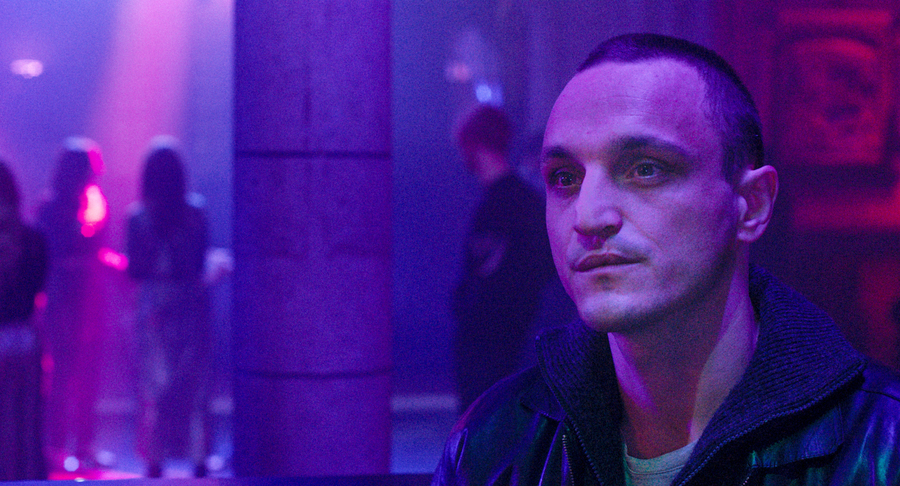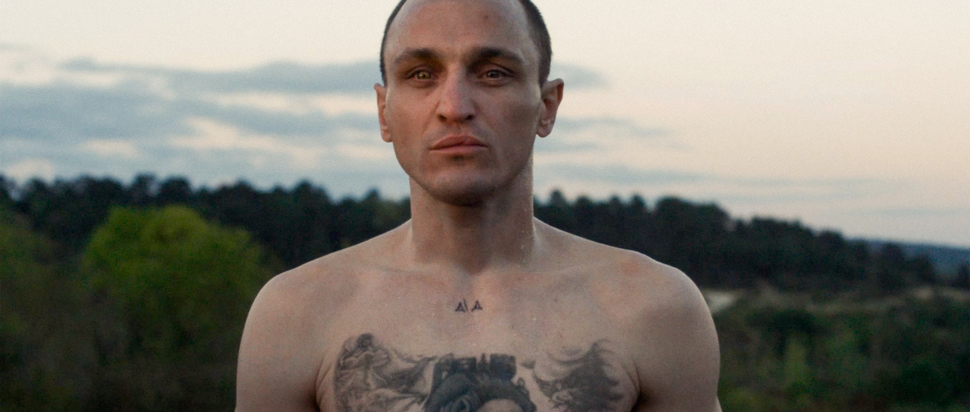Bodies in Space: Franz Rogowski on Disco Boy
Former dancer Franz Rogowski is one of the most exciting and in-demand actors in Europe. Ahead of his latest arthouse triumph, Disco Boy, he discusses his singular approach to acting
Few actors seem as at ease in movement and silence as Franz Rogowski. Despite his striking presence and graceful physicality on camera, the German actor has not purposefully sought out this reputation. “I guess I am drawn to projects that don’t put everything into dialogue,” he says, speaking over Zoom before the UK release of Giacomo Abbruzzese’s Disco Boy. He reckons that characters who verbalise everything can be one-dimensional; therefore, he prefers to be cast as an observer and listener in stories about complex, universal situations. “Some of us are surrounded by structural violence, some of us are born on the bright side of life,” he says. “But stories about the human condition are about solitude and togetherness. What I'm inspired by are movies that create space for layers of cinematography. I struggle with films that serve the actor to show off skills he acquired at an acting academy.”
Disco Boy, with its night-vision battles and hallucinogenic fractured realities, is certainly cinematographic. It follows two lives colliding against their better wishes and plans. After a dangerous illegal border crossing, Belarusian Aleksei (played by Rogowski) joins the French Foreign Legion as a path to naturalisation. Simultaneously, Nigerian Jomo leads a guerrilla band against a multinational industrial development. A Faustian bargain and anti-colonial action are presented within oppressive systems of power.
Abbruzzese first presented the project to Rogowski seven years ago, but the actor wasn't certain it was ready. “Giacomo's production company wanted to rewrite the script,” Rogowski explains. “I felt he wasn't safe – he wasn’t surrounded by people that supported his vision. Then three years ago, we met again, and I felt like we should do this project. I was convinced it was dear to Giacomo and he would do anything to make it happen.”
Many events in Disco Boy are open to interpretation. Rogowski sees the film’s second half as an introspective result of Aleksei’s trauma. “We’re not sure how many things are actually happening and how much is his psyche,” says Rogowski. “But if you talk to Giacomo, these people and ghosts are real.” Art can go beyond the literal, he explains: “When you create a dance, movie, or book, you can create a space where boundaries, rules, or perception can be bent. I guess that's helped me to survive and find happy places.”
In Disco Boy, Rogowski speaks Russian, a new “beautiful” language for him. Is acting different across languages? “Yes, and no,” he explains. “The lines you say as an actor are never yours and never real to a certain extent. It helps to have one more layer of alienation or distortion because it emphasises the fiction. Reality within fiction can't be a reproduction of reality – it is a mixture of lines, lives, textures, textiles, and photography. This mixture allows you to feel the underlying bigger reality of a scene instead of getting lost in the meaning of a sentence. It's a discovery to play in languages that are not yours and to realise you don't really miss anything. I enter a scene, create an intimate moment with someone, and create a soundscape of the human condition.” This, he stresses, is also where silences between lines come into play.

Disco Boy’s final dance scene makes this communication wordless. “We started our process with three weeks of dance rehearsal every day,” Rogowski says. “That was a beautiful way to get to know each other and this vocabulary that wasn't ours.” This night-long disco scene shoot was challenging. “You have to scream at each other, surrounded by extremely loud music,” he recalls. “I don't hear very well, so I'm basically deaf for ten hours of work, pretending it's fun, but all I want is to go home. Then once the cameras are rolling you have to somehow find curiosity and vulnerability in all this madness.” He compares his contemporary dance background to an “architectural installation-like way of using your body” rather than the “dramatic, sometimes cheesy, and almost always passionate” emotions of cinematic dance. “There's a certain layer of insecurity or vulnerability that makes it sometimes hard for me to be a performer perceived as super physical. The truth is I never feel less physical than in dancing.”
But this is neither about meaning nor movement for movement’s sake. “It's totally meaningless that we're doing movies,” Rogowski says, “but you can make a choice and find your own. What I find interesting is to structure time and space and somehow create a transmittable form of your thoughts that you can exchange. I always find it interesting to take the risk and meet with strangers and come up with something beautiful. All you have in that moment is your breath, gravity, and body in space.”
These are not restrictions, but scaffolding to find little freedoms, turning simplicity into momentum. “I often use anger as a basic energy and blame my character,” he says. “So it's not my anger, it's my character’s, and that's already a relief. Then I can wonder, ‘why is this guy so angry?’, and I can think about my own misery but again, blame it on my character. It's as if you expand yourself and start using the material that you're made of. Often in daily life, you are trapped in who you are and who you're supposed to be. When I'm in a scene, I try to use that material but to be less rigid about it, and start modulating that melody.”
Disco Boy is released 29 Mar by Conic
